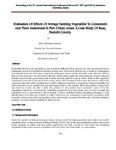| dc.description.abstract | Food safety has become everybody’s concern and it’s difficult to find anyone who has not encountered an unpleasant moment of foodborne illnesses at least once. Food borne illnesses are a result of consumption of contaminated food with micro-organisms, pathogens, heavy metals and other toxic elements. Due to lack of land and water for farming in Nairobi most farmers utilize the land along the sewage which is usually owned by the government and do their farming with the sewage water. Most of the vegetables consumed in Nairobi is produced with sewage water and I wanted to know how the produce affects the consumers since the water contains heavy metals, pathogens and micro-organisms. Sewage vegetables are sold everywhere in the market and they take biggest share in the market. Those who produce using clean tap water are mostly not able to take their produce to the market since consumers come to buy the vegetables at the farm. I realized that vegetables produced using clean water was very few to satisfy the population and so most farmers sold to friends. I used a stratified random sampling technique, I used questionnaire and interview method to collect data from the consumers, I interviewed consumers both from their homes and in the market place since most people consume what they sell. I adopted statistical package for social sciences method for data analysis. | en_US |

